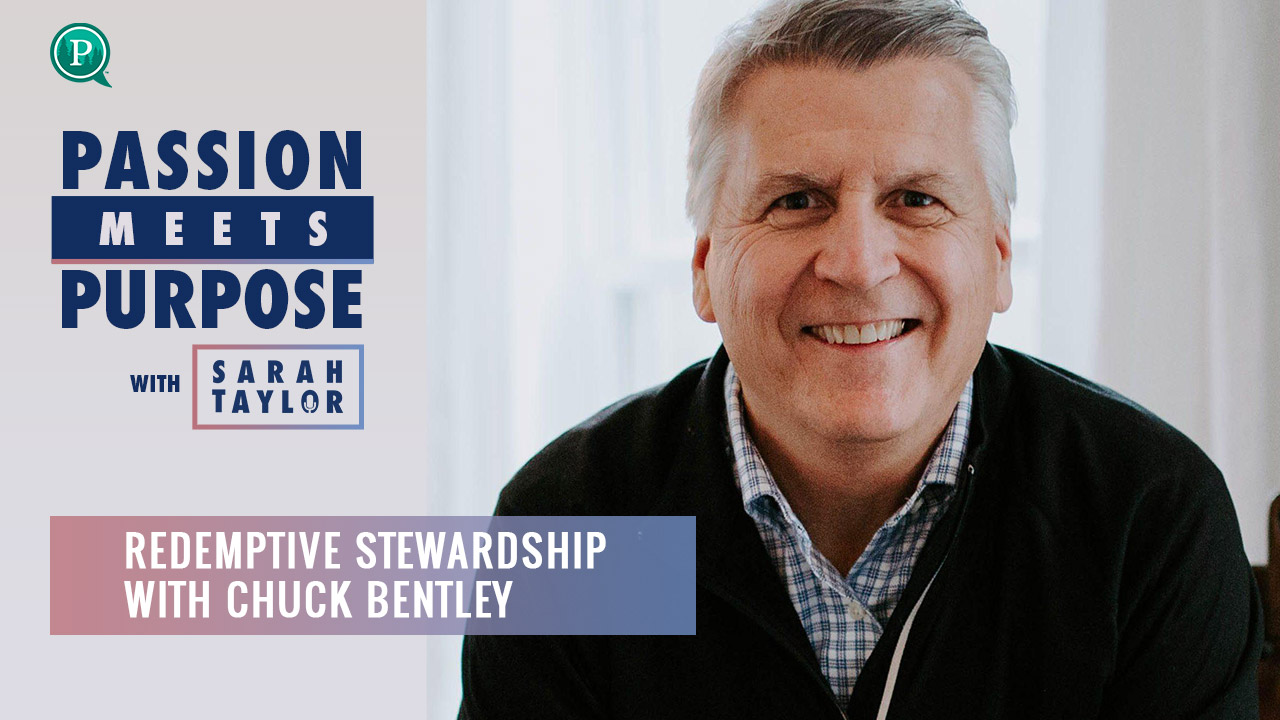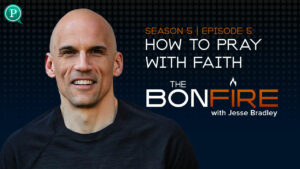His name is Chuck Bentley and he’s the CEO of Crown Financial Ministries. You’ve probably heard of him, and quite possibly are utilizing his sound advice regarding financial matters… but have you heard his story? A favorite quote he shares is,
Out of your misery will come your ministry.
Chuck shares how miserable he was, trying to make more money; fighting for financial security, focusing on more, more, more. Find out what the turning point was in his life that steered him away from the love of money, and how redemptive stewardship brings abundance, in more ways than one.
Interview Links:
Find Chuck Online | Instagram | Facebook | YouTube
Chuck’s Podcast: Family and Finances, Stories of Failure and Success
Book: Economic Evidence for God
Transcription:
Purposely: Your life, God’s Purpose. Listen at onpurposely.com.
Chuck Bentley: God intersected my life. I entered a Bible study where I learned that it’s simple to desire to get rich quick, that I, I, I didn’t know that I was ignorant of that, Sarah, and so I repented of my love of money and that was the turning point in my life.
Sarah Taylor: His name is Chuck Bentley and he is the CEO of Crown Financial Ministries, which is a global Christian financial ministry.
Chuck also has a podcast. He’s got two daily radio broadcasts and is the author of countless books. He’s also the founder and executive director of the Christian Economic Forum, which is a global network of high achievers dedicated to advancing God-inspired solutions to the world’s greatest challenges.
Our conversation is fascinating and I love that we begin by me getting to ask, Chuck, tell me what were you like as a child?
Chuck Bentley: Oh, goodness. I haven’t thought about that in a long time, Sarah. I was outgoing, I was friendly. I loved to play outdoors. You know, we grew up in a very simple lifestyle in a small town in Texas where we didn’t have any form of public entertainment, so I tended to make up my own.
Sarah Taylor: I love that. How do you even see any of those tendencies from childhood are still a part of who you are today?
Chuck Bentley: I would say that I don’t get bored. I don’t know if I’ve ever been bored. I find things, I find things to do. I make up stuff to do. I don’t struggle with finding things that are interesting to me.
Sarah Taylor: So one of the things that you’ve mentioned, I’ve heard you say this before, is that a lot of us develop money habits by the time we’re about seven. We kind of have this world view based on how we grew up. Tell me about what that was like for you growing up.
Chuck Bentley: I had two parents that overcame poverty.
When they look back in their backgrounds, they had a lot of scarcity. They were born during the Great Depression, and so they remember having to go out back and you know, pick things out of the garden. So they had to have something to eat. They understood that life and they wanted to be sure that we didn’t have that.
So mom and dad worked really hard to provide us everything, and by the time I was seven years old, I don’t think money grew on trees, but I really didn’t ever lack, I, I don’t remember a time when my parents said, you know, we won’t be able to do that for you. They, they did, they put on a nice Christmas, they always had great birthday parties.
We traveled, we did things that, looking back, I know were quite sacrificial for them, but I didn’t have to, it never felt sacrificial for me.
Sarah Taylor: So how old were you when you started realizing that not everyone had that opportunity as a child or that approach and you really got interested in diving more into what God says about money?
Chuck Bentley: I didn’t realize that we were, what I would consider middle class until I got older and discovered there was a lot of affluence out there in the world. And for me, Sarah, I, I decided that that was the way that I wanted to sort of keep score. I was an athlete in high school. I enjoyed playing on sports teams where we had some success and I got this sort of sense of worth by winning at sports, and I converted that attitude towards business.
I thought if I can win at business, then it will make me feel good. It will, you know, provide a nice reward. And everything will be taken care of if I just be sure that I’m always winning at whatever I’m doing in a business environment.
Sarah Taylor: But that’s not the mission statement of Crown Financial.
So there must have been a learning curve from that point to where you are now.
Chuck Bentley: Well, there was a steep learning curve because what happened to me is I, I went headlong into the, I guess I would say the desire and the attempt to get rich quick. I didn’t wanna get rich by the time I was older. I wanted it to happen when I was young.
And I wanted it to bolster my self-esteem, my identity, the way I felt about myself. So I worked really, really hard at making money, and that certainly is not the mission statement of Crown. And so what happened is God intersected my life. I entered a Bible study where I learned that it’s sinful to desire to get rich quick, that I didn’t know that I was ignorant of that Sarah.
And so, I repented of my love of money, and that was the turning point in my life.
Sarah Taylor: Tell me a little bit more, like, break that down for me. What happened?
Chuck Bentley: Well, they say that out of your misery will come, your ministry. And I was miserable, or at least I was making my wife miserable because I always was working hard for more.
I didn’t have any contentment. I had no peace. I had no spiritual goals. I was driven to reach the goals that I’d set for myself, but they weren’t goals for our family. They weren’t goals for impacting God’s kingdom. And when I realized that money had control of my life, I said to the Lord, I’m sorry. I can’t believe I let this happen.
I knew better and I won’t ever let it happen again. I will not allow money to be my master and it will no longer be in control of my life. So I set new goals. I literally said Lord what do you wanna do with my life? Not what do I wanna do with my life, with all the money I was going to make, but what do you wanna do with my life?
How do you want me to spend my days? And that led me to the desire to help others with their finances.
Sarah Taylor: Why do you think that faith and money are so interconnected?
Chuck Bentley: Well, the Lord says they are. He says, we cannot serve both God and money. And that means that only one of them can be in control of your life.
One of them is gonna be master over you. And I think it’s because money has God-like properties, Sarah. Money can make you feel secure. It can make you feel important. It can make you feel safe and strong; all of the things that where we should derive our identity from God and our security from God, all those things, money is a very bad substitute for, but it certainly presents itself with God like strength and characteristics, and I think that’s why it gets so confusing.
Sarah Taylor: I love the Why We Exist page at Crown Financial. It says to spread the principles and practices of God’s economy throughout the world. What’s the difference between our current economy and God’s economy?
Chuck Bentley: That’s a great question because there’s a vast difference. I would say it starts with what’s in our heart.
You know, people can do the exact same thing. There’s five elements of an economy. You have to work, give, save, spend, and invest, work, give, save, spend, and invest. And anybody can do that. In fact, everybody in the world does those five things. The difference is in God’s economy, we do them for a different motive . We do them for a different outcome.
We can be selfish, greedy, we can be filled with coveting and a desire to dominate other people financially, to rule over them. And God takes all of that away and he says, yes, go to work. Work as unto me. Give generously, save wisely, spend carefully, and then invest wisely as well.
But for the purpose of being faithful to him and to grow in and expanding his kingdom. What I wanted, Sarah, was I wanted to build my own kingdom. I wanted to make life on Earth more comfortable for me, and I was not even thinking about how I manage money and what it would do, the decision I made, what it would do eternally and God’s economy shifts our focus from living for the present and for this lifetime to thinking about the decisions we make as not for that day when we stand before the Lord, what will he say about those decisions?
Sarah Taylor: Mm. The world is not in danger of running out of resources, but you believe that the world is in danger of running out of faithful stewards. That is a powerful statement.
Chuck Bentley: There’s a lot of fear around scarcity. The doomsayers of the world who especially say that the world’s overpopulated, they have a flawed view of mankind.
They see us as simply greedy consumers that are just chewing up all the world’s resources, and we’re doing it faster than they can be replaced, and therefore, people are bad for this or, they’re bad for the earth. God’s economy says the exact opposite. We are not simply consumers, we’re also producers. And so when we produce and work as God tells us to, then we provide a surplus, an abundance.
We provide more than we need for ourselves. That allows us to give, that allows us to invest, that allows us to share. It makes the world go ’round. And so, we we’re not gonna run out of resources as long as there are people who are good stewards, who are going to work and faithfully producing more than they consume and sharing it with the world.
And so far resources have outgrown population growth. America used to be two or three, 4 million people, you know. Now we’re over 300 million, and yet our prosperity has outpaced our population growth because we’re very hard workers.
Sarah Taylor: You have a term for this. It’s called redemptive stewardship.
Chuck Bentley: Yes, redemptive stewardship is when God uses a faithful steward to restore what is broken.
Behind every problem in the world, there’s a lack of stewardship, and behind every solution, there’s a good steward who’s faithfully doing their duty. So whatever problem you wanna solve, you have to first identify who’s the steward, who’s responsible for this problem, who’s willing to take the burden of solving that problem.
And to thankfully go about their duty. That’s why I believe redemptive stewardship is God’s operating plan for mankind. That’s how he intends for us to operate. This is not, you know, some simple side course where we help get our finances in order to get on a budget and pay down our debt. Now, God’s economy is the way he intended for the whole world to operate.
And when we understand the importance of it, we see not only the joy of what we get to do every day, Sarah, but also what we have to look forward to eternally because he says we’ll be his steward forever.
Sarah Taylor: Let’s talk, you’ve mentioned this twice now, about eternity, and I think that maybe one of the reasons that people have a hard time storing up treasure in heaven is cuz they aren’t quite sure what heaven’s gonna be like.
So this is your opportunity to tell us, what do you think it’s gonna be like?
Chuck Bentley: Well, thanks for an easy question. You know, I don’t know, Sarah. I think about it a lot. It’s mysterious to me. I, I think, I don’t think we’ll have money. I think that would solve a lot of problems where we don’t even need money.
But I think that we’re going to be eternally motivated by God’s love and by his power and his way of doing things will be redeemed from our sinful flesh, and we will get to spend eternity worshiping him and serving him. Some of the mystery, as he says in Matthew 25, that he will put us in charge of cities, if we’ve been faithful on Earth.
And that just blows my mind that we will have a job in heaven. We’re not gonna be just floating on clouds or fishing over the edge of a silver line cloud like it shows in the movies, but we’re going to have something to do and we’ll be able to do that as unto the Lord forever.
Sarah Taylor: And for someone who admittedly doesn’t get bored, what would you say to someone that still isn’t quite convinced they’re not gonna be bored for eternity?
Chuck Bentley: I get excited about it, Sarah, I think because there’s so many dimensions to it and I’ve read a number of great books on heaven. I’ve read Randy Alcorn’s work and a number of others who sort of paint pictures of what it’s gonna be like.
But there’s a deep satisfaction in doing a job well. And if you think about how it felt, if your parent, as you were growing up, would say, great job, Sarah. You did that so good. Or even at school, if you, if you did something where the class said, wow, that was super, and there’s something inside us that draws so much from affirmation, and so the Lord says in Matthew 25, the great affirmation is that we multiplied resources.
That’s the parable of the talents and that he wants us to work on his behalf doing that forever. And he says, enter into the joy of your master. You’ve made me happy by your hard work. You’ve made your father proud of what you’ve done. Now I’m gonna let you work for me forever. And I just get thrilled with even the thought of it.
I can’t imagine there’ll be one nanosecond that we don’t know what to do or enjoy doing it.
The Passion Meets Purpose podcast is made possible thanks to our friends at Northwest University, ensuring a welcoming spirit for you. At Northwest University, your tuition remains lower than all other Christian schools in Washington. And NU is all in on tech. They’ve got a brand new state-of-the art technology studio and majors include UX design, data science, video production, audio production, and computer science.
This is in addition to an already diverse offering of business, nursing, education, sciences, communication, psychology, music and humanities. Northwest University is a faith-based community, Christ centered in all they do. At Northwest University, your future isn’t canceled, it’s just beginning.
Sarah Taylor: I love that you really address the why behind all of the, you know, the practices that we can all follow financially because the why is, yeah, we do need to have a right view of eternity if we’re gonna get excited about storing up our treasure there and about God’s economy. And another thing that you’ve said is that the practice of biblical stewardship, not only does it restore broken finances, but it restores broken marriages, families, businesses, communities, even nations.
Chuck Bentley: Well, we’re seeing that right now. Some of our programs have been adopted nationally by two African countries, and I’m on my way this December to visit a third nation that the president has asked for us to begin teaching on a national scale, what it means to be a faithful steward of the land.
And of the resources that that land produces. And we’ve seen that that works in practicality. This is not a simple sort of laboratory thinking or, or philosophical ideas. We’ve seen it work in real practice when people do things faithfully and at a high standard that God said are good for them. And not only did they benefit their family benefits and the whole nation benefits.
Sarah Taylor: So we’ve talked a lot about some of these concepts and you just mentioned how you know it can be everything from an individual to a whole nation. Let’s talk about where a lot of people are coming to find this podcast from, and that is, it’s a really volatile time financially in all of our 401ks. I don’t even wanna open my retirement statements.
What are your thoughts on the current financial market?
Chuck Bentley: Well, we’re in a difficult time. Our government is trying to control what I believe is self-inflicted inflation. We had, because the covid impact of the economy, we pumped a lot of money into the economy. We, you know, I got checks in the mailbox that I wasn’t asking for, but the government was sending me money and millions of other people, and then we had a supply chain disruption when factories shut down.
So it was a perfect storm. My view is probably 12 months from now, inflation will be under control and we will be back to a stabilized steady growth of the US economy. And I think this storm is going to pass. I’m actually optimistic. And for those that are like you, Sarah, don’t wanna look at 401k, it’s a good time not to.
Just, just leave it alone. You know, give it, give it 12 months, give it two years before you look at it, it will have gotten better. We’ve bounced back historically within 18 months of a recession, and I think we’re on that path.
Sarah Taylor: That’s good to hear. What about for someone that’s coming to you and they feel like they’ve only made money mistakes, or they are like, I don’t, they haven’t even put something in a 401k yet, and they’re just feeling like they don’t even know step one.
Chuck Bentley: Well, I’m a good person to talk to because I’ve done every single bit of that . You know, there’s not a single financial mistake that I have not made, Sarah and I, I think I can say that with a lot of conviction because I was so eager to try to get ahead of everybody else. What it did is it caused me to trip over my own two feet, over and over and over, and I’ve been serving others and trying to help others with their finances for 22 years now.
And so I’ve heard a lot of the pain. I’ve heard a lot of the shame that people carry with them. I know I’ve had people sit in front of me and say, it doesn’t matter what you say, I can’t do it. I can’t put it into practice. I’m bad at this. I’m bad at numbers. And so Satan just gets people really, really defeated around this area.
But it’s possible. And I’m exhibit A. You know, I had to learn from really losing so much money in our early life because I would borrow and invest and investments didn’t work out. And then I would be struggling to pay back loads and loads of debt. And then somebody would send me a credit card at 25, with 30% interest, and I would open the credit card and pay off old bills.
And I just I just multiplied stupid. Over and over and over. And it was my wife’s patient endurance, praying that the Lord would get my attention. That really changed. She couldn’t believe that I would one day agree to her living on a budget to carry around cash in my pocket and not overspend what was in my own pocket.
But I did that. I started with the very basics. And God rebuilt our marriage. He built, rebuilt our finances. He added back to us more than we could dream or imagine by just going to a very simple, humble way of managing whatever he provided. And we, we sort of had to do it the hard way.
Sarah Taylor: And for anyone that wants to hear more stories about that, you and your wife have a podcast, we’ll link up to it in the show notes.
It’s called Family and Finances, stories of Failure and Success. One of the things you mentioned earlier, and I just remembered now my follow up question to it, is when you alluded to your own kind of come to Jesus moment with finances back in the day, you realize that like more wasn’t better. And we get fed that lie every day through our culture, through our phones.
Like even if we know it’s not true, if you’re told something enough, you start to wonder maybe it is. And so, and every advertisement we see is designed to make us feel like we don’t have enough unless we buy the product. So can you talk to how more is not better?
Chuck Bentley: Yes, I can. Fidelity did a survey of all the people who had an account with them, at least a representative statistical survey, and asked them, how much money do you need at what income level would make you feel really comfortable or well off financially?
And the answer shouldn’t surprise us, but across the board, the majority answer was twice as much as I have now. That’s, that’s what people thought. And I think that’s very common, that it’s just out of reach. If I could just get a little extra, if I could just get a little more, if I could just win the lottery once or twice, you know, those kind of things would bail me out.
The truth is that we all live with incredible abundance. You know, we have air conditioning, we have we can get on an airplane and fly anywhere. We have those warmers on our leather seats out here, you know, where I live, where it gets cold, all of those crazy luxuries. And we have to recognize that God has given us an abundance, that we need to be responsible to manage it well, to manage it faithfully, and to just start wherever we are.
And to say, Lord, okay, I’m gonna learn what it means to be content. I’m gonna learn what it means to be faithful with a little. I’m gonna start putting one foot in front of the other and just rebuild our finances. I’m gonna start paying down debt, improving my savings, ensuring that we have enough set aside for the future to take care of all the expenses that are coming at us with children and tuition and braces and weddings, and we’re gonna just do it one day at a time and trust you along the way.
Sarah Taylor: As we wrap up our time, you’ve written so many books, I’ve lost count. But do you wanna mention just a few of the book resources that you have and a few resources at Crown Financial where someone can just hop right over there after they’re done listening to us?
Chuck Bentley: Yeah Sarah, they can go to crown.org and get tons of free resources. Our most popular destination is our financial calculators. Calculators to help people figure out how to pay down debt if they need to refinance. What is the latest impact of mortgage rates if I need to buy a home? We’ve got free budget forms for the number of children you may have or income level.
So that’s a really popular place for people to go as well as all of our resources. But I have written a new book called Economic Evidence for God, and I’m really so excited about it because I believe that not, not only does science, not only does theology, not only does creation or you know the, you just pick a topic that that point, archeology all point to the reality of God. I believe the economy does as well. So I’ve written a book about it. I hope people will pick it up and read it. To me, it’s just so obvious that if we observe the world to a financial lens, that he had to have created it, set it in motion, and he knows how to make it work best.
And I think the book will really be exciting for people to have that viewpoint as they manage their own finances.
Sarah Taylor: Chuck, thank you so much for your time. Your heart shines through as for the reason that you do all of this. So thank you so much.
Chuck Bentley: Well, Sarah, I appreciate what you do. I’m always honored to be a part of the outreach of your ministry, and I do pray that it encourages those, especially those who maybe just feel hammered right now.
They’re hammered by fear or doubt, or stress, or their strife or reconciliation is needed. I just pray this will encourage them. Sarah,
Sarah Taylor: We’re gonna link up to everything we talked about in the show notes so that you can find all the resources that Chuck described. Our thanks again to Chuck Bentley and his team at Crown Financial. To our content coordinator, Rebecca Beckett, producers Luke Swanberg and Scott Karow, and of course you, for listening. We’ll talk again in two weeks.








